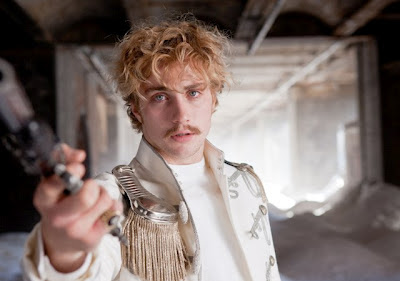N.B. Click on the image above or scroll down to the bottom to watch the film.
How would you tell the story of love? Split it up into acts and set pieces? A sleek dialectic of heady triumphs and devastation? Give it a beginning without an end? Impossible. Love is a hazy netherworld. A performance of repetition. A choreographed dream.
And what colour would you paint it? Rich, dark, Renaissance crimson? You’d be wrong to. Love has a pale colour palette of flesh and curtain lace. Ruptured by smeared charcoal and finger-scraped scars. Gentle plum bruises. Butterflies and shawls that warn more than they delight.
Alma Har’el’s beautifully conceived film for Sigur Ros’ Fjögur piano is an astounding exploration of love: bleak and indicting, yet strangely hopeful. Cautious, honest, and deeply moving.
Shia LeBouf and Denna Thompson tumble majestically through a staggering and intimate performance. Painfully rehearsed honesty boxed in by a bedroom window frame.
Diving into trashy, colourful, hedonistic video guilt. Glaring aquamarine. MTV and ketamine. Generation something.
Slipping silently into a room filled with butterfly memories. Carefully preserved. Muted mauve melancholy. Calm. A delicate and cherished place they intrude upon with the people they've become – crashing in at dawn, trailing the mire of late nights and unblinking eyes.
Pushing each other into sudden frenzied anger. Volatile. Locked in to one another. Free falling.
Then suddenly absent. Panicked and lonely. Fragile.
Then clashing again. Tearing and grasping at each other. Frenzied hand marks tracked in tar. Laying in a nest of hair and tear stream smears. Frozen mid fight in a petrified, breathless sleep.
Waking to a new day. A new tussle of love…
Love. The most impossible dilemma and the simplest truth. A shifting, ungraspable boundary we yearn for like a desert horizon - longing for that crisp canyon cut while we're swallowed whole by the endless earth.
The sweet Harpy song that tears you away from the things you knew and throws you headlong into a gathering storm. All life's lessons unlearned in an instant.
Love is endless splendour. Bewildering and dangerous. Blamed and cherished. The suture for our deepest wounds. Never. Ever. Forgotten.
The Halcyon bird.
The Phoenix that survives the flames.
How would you tell the story of love? Split it up into acts and set pieces? A sleek dialectic of heady triumphs and devastation? Give it a beginning without an end? Impossible. Love is a hazy netherworld. A performance of repetition. A choreographed dream.
And what colour would you paint it? Rich, dark, Renaissance crimson? You’d be wrong to. Love has a pale colour palette of flesh and curtain lace. Ruptured by smeared charcoal and finger-scraped scars. Gentle plum bruises. Butterflies and shawls that warn more than they delight.
Alma Har’el’s beautifully conceived film for Sigur Ros’ Fjögur piano is an astounding exploration of love: bleak and indicting, yet strangely hopeful. Cautious, honest, and deeply moving.
Shia LeBouf and Denna Thompson tumble majestically through a staggering and intimate performance. Painfully rehearsed honesty boxed in by a bedroom window frame.
Diving into trashy, colourful, hedonistic video guilt. Glaring aquamarine. MTV and ketamine. Generation something.
Slipping silently into a room filled with butterfly memories. Carefully preserved. Muted mauve melancholy. Calm. A delicate and cherished place they intrude upon with the people they've become – crashing in at dawn, trailing the mire of late nights and unblinking eyes.
Pushing each other into sudden frenzied anger. Volatile. Locked in to one another. Free falling.
Then suddenly absent. Panicked and lonely. Fragile.
Then clashing again. Tearing and grasping at each other. Frenzied hand marks tracked in tar. Laying in a nest of hair and tear stream smears. Frozen mid fight in a petrified, breathless sleep.
Waking to a new day. A new tussle of love…
Love. The most impossible dilemma and the simplest truth. A shifting, ungraspable boundary we yearn for like a desert horizon - longing for that crisp canyon cut while we're swallowed whole by the endless earth.
The sweet Harpy song that tears you away from the things you knew and throws you headlong into a gathering storm. All life's lessons unlearned in an instant.
Love is endless splendour. Bewildering and dangerous. Blamed and cherished. The suture for our deepest wounds. Never. Ever. Forgotten.
The Halcyon bird.
The Phoenix that survives the flames.






